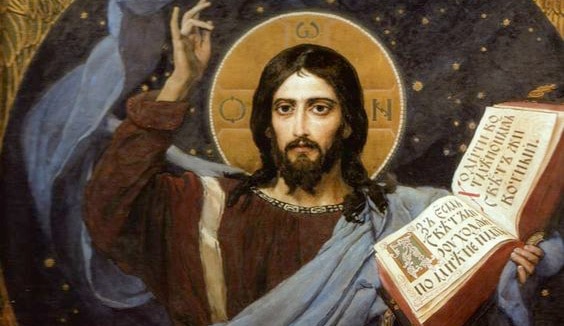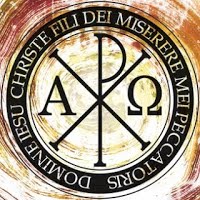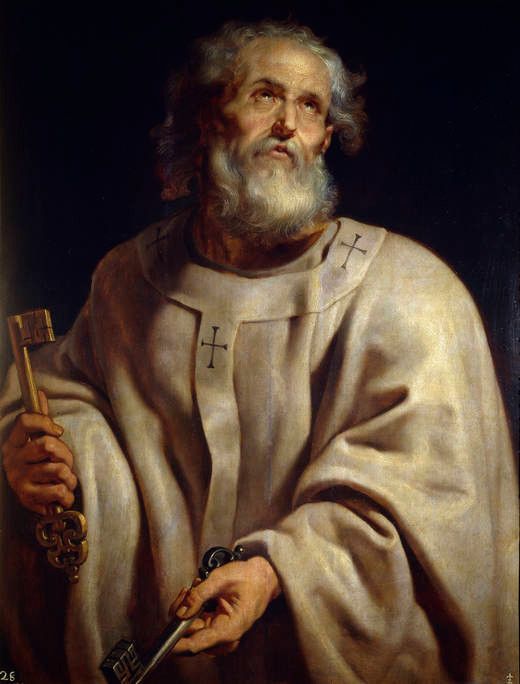
- The Latin language was consecrated at the Passion by its mystic inscription on the Cross.
- “From the first four centuries, no liturgy can be shown to be composed in any other language other than the three languages from the inscription on the Cross.” (Gihr)
- The Body of Christ was nailed to the Cross, the Altar of sacrifice, and the sacred languages bearing His title were nailed there on the Altar with Him.
- Our Lord Himself prayed in non-vernacular ancient Hebrew, used almost exclusively in rabbinical temple worship.
- “The Latin language…has been consecrated through constant use by the Apostolic see, the mother and teacher of all Churches.” – Pope St John XXIII, Veterum Sapientia, 1962.
- To consecrate by definition means “to make holy”; in a similar manner bread and wine are consecrated when they become the Body and Blood of Christ.
- “Latin was the language used by St. Peter when he first said Mass at Rome. It was the language in which that Prince of the Apostles drew up the Liturgy” (Fr. Michael Muller, C.SS.R., The Holy Sacrifice of the Mass).
- “The most ancient custom of the Church agrees…in the whole West there are no ancient liturgies except in Latin” (St Robert Bellarmine, On the Most Holy Sacrifice of the Mass).
- The Latin language was sanctified by the usage of 2000 years, and it was most closely interwoven with the primitive Roman Catholic liturgy (Gihr).
- Sacraments and sacramentals are made holy by the prayer of the priest such as the exorcizing and blessing of an object. The Latin language similarly is in itself as a language holy; it is sacred, and thereby brings great favor with God.
- Prayer in Latin is a prayer in union with the rest of the Church in the same universal language she has prayed in since her inception.
- The Roman Catholic Church has always been directly connected with the Latin language in its very name as the “Latin Church.” From the early centuries, St Augustine, St Jerome, and other early Church fathers refer to her explicitly by this name. (StA, LII, LXXI; StJ, XLVI, LVIII)
Popes throughout history have unwaveringly embraced and defended the Latin language.
“It must be esteemed a treasure…of incomparable worth.” -PJXIII
“The language of the Angels.” PPVI
Pope Benedict urged All Catholics to pray in Latin.
- Pope John XXIII forever canonized the Latin language in his Apostolic Constitution Veterum Sapientia (1962).
- An Apostolic Constitution is the most solemn form of a papal decree. It was an Apostolic Constitution in which the Immaculate Conception was infallibly defined a dogma by Pope Pius IX.
- Ecumenical Councils have prescribed prayer in Latin.
- The actual texts of Vatican II mandated the retention of Latin in the liturgy – “…the use of the Latin language is to be preserved in the Latin rites” (36). “Nevertheless steps should be taken so that the faithful may also be able to say or to sing together in Latin those parts of the Ordinary of the Mass which pertain to them” (54).
- In Trent, the Church excommunicates all those who declare the vernacular to be the necessary or only permissible language for the liturgy. (Trent, Ss XXII, Ch IX, Can IX)
“The Latin Language is both venerable and mysterious” (The Catechism Explained, FrS).
By praying in a sacred language, Latin has a unique ability to enable greater focus in meditation and deeper levels of mystical prayer.
“Latin points to the unfathomable and unspeakable depth of the mystery of the altar” (Gihr).
“Latin…through its dignified character elicit[s] a profound sense of the Eucharistic Mystery” (Pope John Paul II, Dominicae Cenae, 1980).
“[Latin is] the language of the angels.” (Pope Paul VI, General Audience, Nov 26, 1969).
Latin creates a sense of sacred space and time to help focus on the sense of God’s otherness.
The use of a distinguished language for prayer and worship instills the sense of awe and reverence that reminds us that we are worshiping and imploring the help of the Almighty transcendent God in a way entirely distinct from ordinary chatter with friends.
- This beautiful prayer language elevates the mind and heart through means such as sacred chant and polyphony. Latin’s inherent beauty is evident even to those on the natural level who hear it chanted, prayed, or sung.
- “The phonetic characteristics of Latin, with its alternation of long and short syllables, with the robust but never ungraceful sonority created by occlusive consonants, refined by frequency of sibilants and liquids, make it a poetic language (In Praise of the Tridentine Mass and of Latin, Language of the Church, Fr Spataro, 2019, pg 67).
- It is fitting that a universal (“catholic”) Church should pray in a universal language.
- The Latin language unifies all under one tongue thereby countering the havoc from the tower of Babel, and in a practical way it continues the gift of Pentecost by enabling people from all nations to understand and pray together in una voce (one voice) universally.
- Inhabitants of a country naturally desire immigrants to learn the county’s language. In terms of identity, “Language is the most important cause of unity and feeling at home.” “It brings people together–language.” “Take away a language and people feel out of place” (Sensus Fidelium, 8/12/2014).
- “The Holy Spirit has ‘gathered all the nations from out of the babel of tongues into the unity of faith.’ Being formed of ‘all nations and tribes and peoples and tongues,’ she constitutes but one family of God, one kingdom of Christ, a kingdom not of this world, but exalted above every nation of the earth'” (Fr Gihr, Holy Sacrifice of the Mass).
- “Precisely in the multiplicity of languages and cultures, Latin, for so many centuries the vehicle and instrument of Christian culture, not only guarantees continuity with our roots but continues to be as relevant as ever for strengthening the bonds of unity of the faith in the communion of the Church” (Pope Benedict XVI, Presentation of the Compendium, 2005).
- This universal language creates a spiritual home of prayer anywhere in the world. *It is a good form of globalism!*
- It unites all Catholics together with their spiritual patrimony, as they pray the same prayers in the same language as the Saints have from the catacombs and throughout history.
- Latin in a unique way unites the faithful together in doctrine and belief in the same immutable faith.
When praying in Latin, you are praying in the same exact words in the same exact language that countless Saints have prayed throughout the ages and are being united with them through entering into this venerable tradition they handed down and preserved faithfully throughout the centuries.
Many Saints have commented on their love for the Latin language and prayed both publicly and privately in this lingua sacra. The most famous Saints including St Augustine, St Benedict, St Patrick, Pope St Gregory the Great, St Thomas Aquinas, St Dominic, St Francis of Assisi, St Anthony of Padua, St Padre Pio, St John Vianney, St Frances de Sales, St Alphonsus Liguori, St Catherine of Sienna, and countless Saints throughout all ages of the Church all prayed in the same sacred Latin language.
Latin has always been a part of private devotions.
Because the liturgy is the source and summit of the faith and by its nature far surpasses any private devotion, the Church teaches that “devotions should…accord with the sacred liturgy, [be] derived from it, and lead people to it.” The Latin rite liturgy has been handed down and prayed in Latin from its earliest days throughout the centuries. Thus, private devotions deriving from the liturgy are most fitting to be prayed in that same sacred language.
The Rosary, the greatest private devotion, was also originally prayed, taught, and handed down in Latin, and a regular practice of the Saints was to pray their devotions in their holy Church’s mother tongue.
- This ancient language has a stability, precision, and consistency that is unparalleled, due largely to the fact it is no longer spoken, a so-called “dead language.”
- Unlike spoken languages that are constantly in a state of flux, change, and evolution, the Latin language remains the same.
- “If the sacrifice [of the Mass] were going to be offered in the vernacular…it would be necessary to frequently change the words of the sacrifice whenever the vocabulary, which is common in one time, would later cease to be the vernacular” (St Robert Bellarmine, The Holy Sacrifice of the Mass).
- “It is a fact well known that the meaning of the words is changed in the course of time by everyday usage. Words which once had a good meaning are now used in a vulgar or ludicrous sense” (Fr. Michael Muller, C.SS.R., The Holy Sacrifice of the Mass).
- “It is the question of a dead language and a dying language. Every living language is a dying language, even if it does not die. Parts of it are perpetually perishing or changing their sense; there is only one escape from that flux; and a language must die to be immortal.” (G.K. Chesterton)
- Latin is the language of theological science and precision.
Unchangeable Faith : Unchangeable Language
- “The Latin tongue [is] the key…of sacred science” (Pope Leo XIII, Depuis le Jour, 1899).
- “Hatred for the Latin language is inborn in the heart of all the enemies of Rome. They recognize it as the bond of Catholics throughout the universe, as the arsenal of orthodoxy against all the subtleties of the sectarian spirit . . . We must admit it is a master blow of Protestantism to have declared war on the sacred language. If it should ever succeed in destroying it, it would be well on the way to victory” (Dom Gueranger, Liturgical Institutions, 8).
- For a Catholic to reject Latin is to reject 99% of his liturgical patrimony.
- “The use of the Latin language prevailing in a great part of the Church affords at once an imposing sign of unity and an effective safeguard against the corruption of true doctrine.” (Pope Pius XII, Mediator Dei, 1947)
- Latin—”it is like putting up a bullet proof shield around the most sacred thing that we have, which is the Holy Sacrifice of the Mass, the Eucharist. We cannot risk any slippage in language…Therefore, it’s in Latin. It’s bullet proof.” (Dr Taylor Marshall, 4/24/2019)
- Veiling has always been a part of sacred history. God reveals Himself to His people and directs them to approach and worship Him through various types of veils.
- “We cannot be enlightened by the divine rays except they be hidden within the covering of many sacred veils” (St Thomas Aquinas, Summa Pt I -Sec I -Art9).
- We veil that which is sacred, that which is holy. Thus, it is only fitting that our prayers likewise be covered in a sacred veil.
- Read a full explanation on sacred veiling and how it relates to prayer here. Veiling is everywhere in our faith. This is why we veil.
- Latin covers over and hides the defects of the priest. All priests have various defects in their mannerisms and speech that are hidden through prayer in Latin.
- Latin with its sacred linguistic veil covers over, sanctifies, and mystifies our prayers.

- Prayer in a sacred language manifests God’s transcendence, His beauty, His power, His omniscience, and his His holiness.
- By praying in a distinct language directed only to God, it teaches us humility to learn that He is God, and we are not.
- It further facilitates our worship of God as approaching Him in a unique manner.
- Latin engages the higher faculty of our intellect and gives us something more to strive for, as we continue to “work out our salvation in fear and trembling.” (Philippians 2:12)
- “If,” says St. Augustine, “there are some present who do not understand what is being said or sung, they know at least that all is said and sung to the glory of God, and that is sufficient for them to join in it devoutly.” (The Catechism Explained, Fr.S). (This quote evidences that even from the time of St Augustine the sacred Latin prayers they used in the liturgy were not understood by everyone present, yet all sufficiently join in through their devotion.)
“The Devil hates Latin. It is the universal language of the Church.”
– Exorcist priest Fr. Gary Thomas, subject of the book and film The Rite
(NLM)
Interestingly, there have been numerous reports from exorcists that Latin prayers are more effective in driving away the demonic.
The Vatican’s chief exorcist, Fr Gabriel Amorth, who performed well over 70,000 exorcisms, repeatedly testified to this reality of the power invested in this sacred language. “It is most effective at challenging the devil”

Bishop Andrea Gemma of Isernia, one of the Roman Catholic Church’s leading experts on exorcism, explained, “demons have a horror of [the Latin] language.” He later stated, “The devil is happy with the near-disappearance of Latin”
- When Latin was removed from prayers in the 60s, all hell broke loose throughout the world (Fr Carota, Latin Crushes the Devil).
- “Hatred for the Latin language is inborn in the heart of all the enemies of Rome.” (Dom Gueranger, Liturgical Institutions, 8).
- Latin is also known as the language of the devil’s destruction.
- “Latin is more efficacious than any profane language because of the fact it is a sacred language, and by virtue of it being sacred it is in the eyes of God more precious and more meritorious” (Fr Chad Ripperger, exorcist).
- God appreciates the effort to learn to pray in this sacred tongue and rewards it generously.
- How much more pleasing to God is it then to pray to Him in this most holy sacred language that He has blessed and infused with so much power and grace?
See also Why Pray the Rosary in Latin
Next: ![]() How to Pray in Latin
How to Pray in Latin
What to Pray in Latin:













